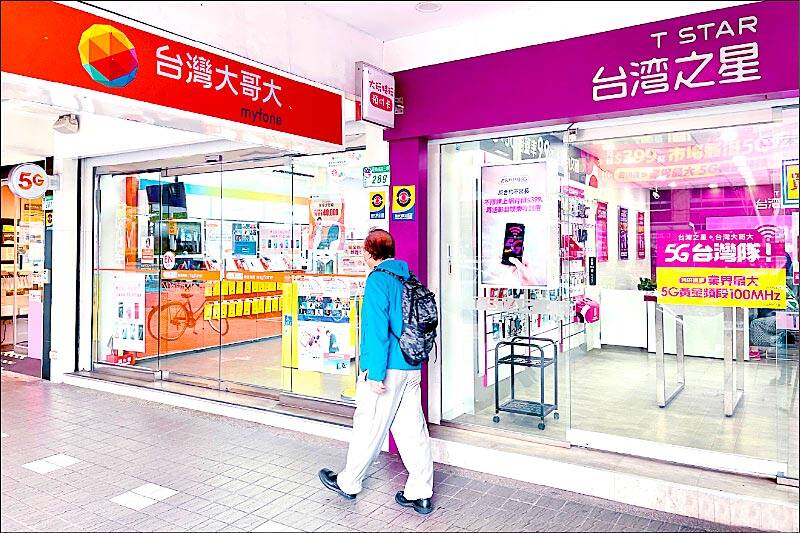Taiwan Star Telecom Corp (台灣之星) was yesterday fined NT$16 million (US$505,929) for failing to thoroughly verify the identities of subscribers and consequently allowing Chinese scammers to use mobile phone numbers to commit fraud, after it was fined NT$1 million for the same offense last week.
It was the highest accumulated fine that a telecom has received for a single offense in one day, NCC Vice Chairman Wong Po-tsung (翁柏宗) told a news conference yesterday.
The New Taipei City Prosecutors’ Office in January charged Luo Kai-chieh (羅楷傑) and two associates with contravening the Personal Data Protection Act (個人資料保護法).

Photo: Ting Yi, Taipei Times
Prosecutors said an investigation found that Luo and his associates had since September 2020 created 12 fake companies to apply for approximately 27,000 sets of mobile phone numbers from Taiwan Star that they resold to Chinese scammers for NT$1,300 each.
After the scammers secured the personal information of multiple Taiwanese nationals, they used the the mobile phone numbers to register on several popular e-commerce platforms, such as Shopee, prosecutors said.
The scammers used the platforms to sell contraband to unwitting buyers or engage in fake transactions with them, prosecutors said, adding that they also asked for donations for nonprofit organizations and then asked the victims to cancel their payments and wire the money to Shopee’s e-wallet instead.
The scammers then used the funds to purchase virtual currencies to cover their tracks, prosecutors said.
Although Shopee and telecoms have since May 2021 improved their verification systems for users, Luo and his associates set up a modem pool in a civilian’s home in New Taipei City’s Xinzhuang District (新莊區) to receive the verification codes from Shopee and other e-commerce platforms.
Records from Taiwanese customs showed that Luo applied to have Taiwan-made SIM cards exported to China 47 times.
Prosecutors have asked the court to consider a severe punishment for Luo and his associates as they conspired with Chinese scammers resulting in huge financial losses for Taiwanese citizens.
“After learning about the indictment in the news, we have also received leads for investigation from the New Taipei City and Kaohsiung prosecutors’ offices. Our investigation showed that a salesperson surnamed Tsai (蔡) in Taiwan Star’s corporate account department colluded with Luo by helping him obtain a large number of mobile phone numbers and bypassing the telecom’s identity verification and risk-control mechanisms,” Wong said.
“Taiwan Star has apparently lost administrative control over its employees and mobile phone numbers,” Wong said.
The commission yesterday deliberated over the offenses committed by eight of the 12 firms owned by Luo and his cohorts, he said.
“The telecom’s dealings with four of them showed major negligence on its part, and the commission ruled that it be fined NT$2.5 million for each case. For its dealings with the other four companies, the telecom was fined NT$1.5 million each. The telecom was fined a total of NT$16 million as per the Telecommunications Management Act (電信管理法),” Wong said.
The commission has yet to review four other cases where 3,010 Taiwan Star mobile phone numbers were exploited by scammers, he said.
Taiwan Star said that the commission’s ruling was unfair and it would appeal it.

‘DENIAL DEFENSE’: The US would increase its military presence with uncrewed ships, and submarines, while boosting defense in the Indo-Pacific, a Pete Hegseth memo said The US is reorienting its military strategy to focus primarily on deterring a potential Chinese invasion of Taiwan, a memo signed by US Secretary of Defense Pete Hegseth showed. The memo also called on Taiwan to increase its defense spending. The document, known as the “Interim National Defense Strategic Guidance,” was distributed this month and detailed the national defense plans of US President Donald Trump’s administration, an article in the Washington Post said on Saturday. It outlines how the US can prepare for a potential war with China and defend itself from threats in the “near abroad,” including Greenland and the Panama

A wild live dugong was found in Taiwan for the first time in 88 years, after it was accidentally caught by a fisher’s net on Tuesday in Yilan County’s Fenniaolin (粉鳥林). This is the first sighting of the species in Taiwan since 1937, having already been considered “extinct” in the country and considered as “vulnerable” by the International Union for Conservation of Nature. A fisher surnamed Chen (陳) went to Fenniaolin to collect the fish in his netting, but instead caught a 3m long, 500kg dugong. The fisher released the animal back into the wild, not realizing it was an endangered species at

The Chinese Nationalist Party (KMT) is maintaining close ties with Beijing, the Democratic Progressive Party (DPP) said yesterday, hours after a new round of Chinese military drills in the Taiwan Strait began. Political parties in a democracy have a responsibility to be loyal to the nation and defend its sovereignty, DPP spokesman Justin Wu (吳崢) told a news conference in Taipei. His comments came hours after Beijing announced via Chinese state media that the Chinese People’s Liberation Army’s Eastern Theater Command was holding large-scale drills simulating a multi-pronged attack on Taiwan. Contrary to the KMT’s claims that it is staunchly anti-communist, KMT Deputy

The High Prosecutors’ Office yesterday withdrew an appeal against the acquittal of a former bank manager 22 years after his death, marking Taiwan’s first instance of prosecutors rendering posthumous justice to a wrongfully convicted defendant. Chu Ching-en (諸慶恩) — formerly a manager at the Taipei branch of BNP Paribas — was in 1999 accused by Weng Mao-chung (翁茂鍾), then-president of Chia Her Industrial Co, of forging a request for a fixed deposit of US$10 million by I-Hwa Industrial Co, a subsidiary of Chia Her, which was used as collateral. Chu was ruled not guilty in the first trial, but was found guilty